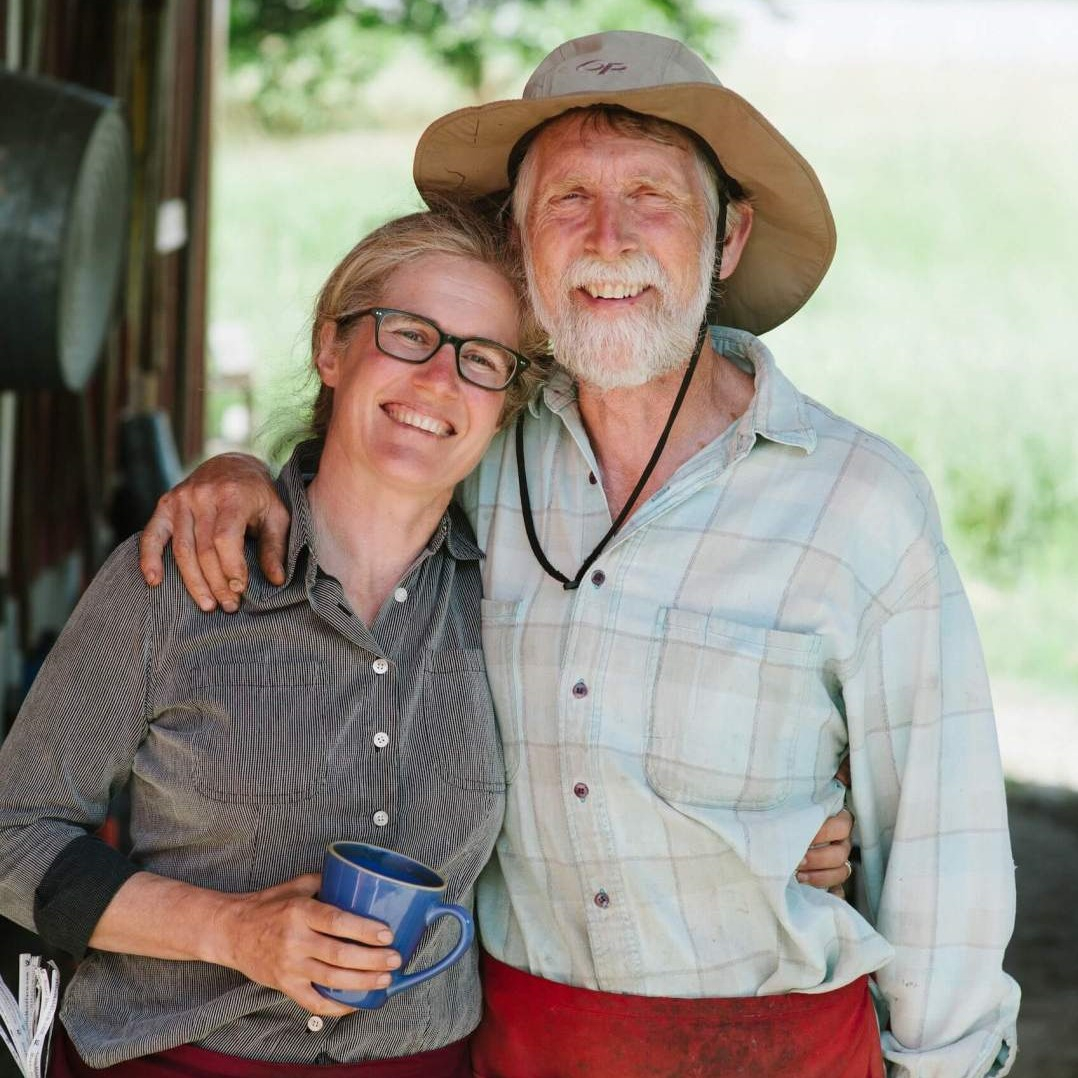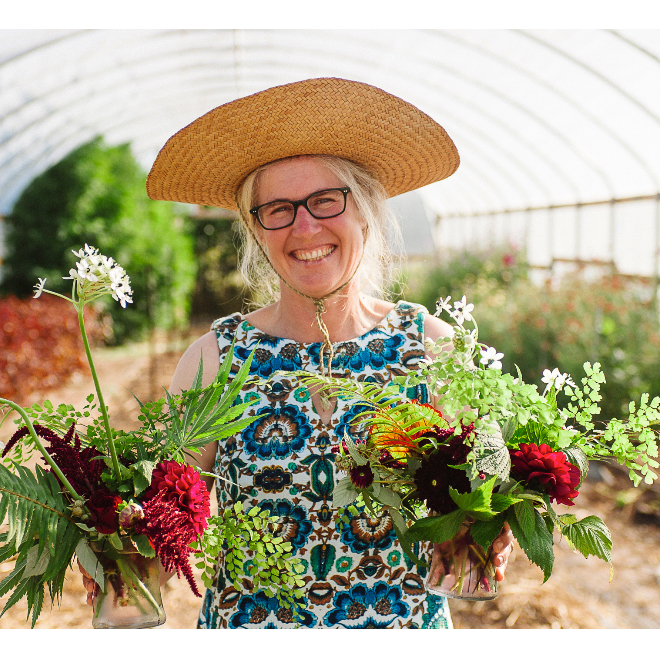Producer


Jello Mold Farm
Contact: Diane Szukovathy and Dennis Westphall
City: Mount Vernon, WA, 98273
Website: www.jellomoldfarm.com
About Us
Jello Mold Farm takes its name from a building in Seattle’s Belltown neighborhood that Diane once covered with 400 copper-hued Jello molds of all shapes and styles. Dennis is a founder and director of Tickle Tune Typhoon, a much loved and nationally renowned children’s music company.
After years of estate gardening in and around Seattle, the couple yearned to put their creative energy into a venture that combined their sustainable values with an obsession for plants. Jello Mold Farm began selling cut flowers in 2008 and by 2009, the farm was making regular deliveries to Seattle florists and retail customers. Diane and Dennis take delight in seeing people make an emotional connection to their flowers and their enthusiasm is contagious. “Quality is our best calling card,” Diane says. “Fresh and local sells.”
Education is threaded through everything Diane and Dennis do as farmers. “When consumers value the health benefits (to themselves and to the planet) of bringing home local and sustainably-grown flowers, demand will grow,” she explains.
Diane is the Board Vice Chair and Treasurer of the Seattle Wholesale Growers Market Cooperative. She works closely with other flower farmers in the region with the belief that by combining their efforts through a centralized marketplace, local farms will attract more buyers and, in turn, be able to expand the varieties and quantities of flowers they grow.
After years of estate gardening in and around Seattle, the couple yearned to put their creative energy into a venture that combined their sustainable values with an obsession for plants. Jello Mold Farm began selling cut flowers in 2008 and by 2009, the farm was making regular deliveries to Seattle florists and retail customers. Diane and Dennis take delight in seeing people make an emotional connection to their flowers and their enthusiasm is contagious. “Quality is our best calling card,” Diane says. “Fresh and local sells.”
Education is threaded through everything Diane and Dennis do as farmers. “When consumers value the health benefits (to themselves and to the planet) of bringing home local and sustainably-grown flowers, demand will grow,” she explains.
Diane is the Board Vice Chair and Treasurer of the Seattle Wholesale Growers Market Cooperative. She works closely with other flower farmers in the region with the belief that by combining their efforts through a centralized marketplace, local farms will attract more buyers and, in turn, be able to expand the varieties and quantities of flowers they grow.
Practices
Our seven acre Salmon-Safe certified farm sits in the Skagit River Delta and provides habitat to an astounding web of wildlife. Beyond freedom from toxic chemicals and fertilizers here is how we define sustainability~
A resounding commitment to land stewardship – maintaining wild corridors, hedgerows and plant diversity is as important to us as the crops we grow. We make sure our farm provides a bridge from the river wetlands into farm fields for many animals from the smallest insects to frogs, birds and mammals.
Healthy soil – by adding mineral amendments, certified organic fertilizers and compost, we enrich the soil as we farm. We rotate our crops and prevent erosion with living mulches and minimal tilling. Because we grow so many different kinds of plants, our farm supports a wide array of insect life. This rich diversity helps to keep crops pollinated and disease cycles and pests in balance.
Smart use of resources – like most small-scale farmers, we are passionate recyclers. From purchasing used building materials to recycling plastic pots, paper, glass and metal, if we can figure out another use for it, we keep it in the chain. We use drip irrigation and mulching techniques to minimize water use. And we are committed to marketing our products locally.
Making a living – our farming practices begin and end with a commitment to land stewardship. Part of that commitment includes making a living so we can stay on the land. We network and share resources with other farmers and we strive to pay a living wage to ourselves and those who work with us.
Advocacy – 80% of cut flowers sold in the United States are imported. Most come from countries with cheap labor and less developed environmental standards. Due to global trade agreements, there are no tariffs on imported flowers. Consumers most often do not know where their flowers come from. Our farm supports joint efforts by U.S. flower farmers to raise consumer awareness and to help preserve our domestic and local flower farming heritage.
A resounding commitment to land stewardship – maintaining wild corridors, hedgerows and plant diversity is as important to us as the crops we grow. We make sure our farm provides a bridge from the river wetlands into farm fields for many animals from the smallest insects to frogs, birds and mammals.
Healthy soil – by adding mineral amendments, certified organic fertilizers and compost, we enrich the soil as we farm. We rotate our crops and prevent erosion with living mulches and minimal tilling. Because we grow so many different kinds of plants, our farm supports a wide array of insect life. This rich diversity helps to keep crops pollinated and disease cycles and pests in balance.
Smart use of resources – like most small-scale farmers, we are passionate recyclers. From purchasing used building materials to recycling plastic pots, paper, glass and metal, if we can figure out another use for it, we keep it in the chain. We use drip irrigation and mulching techniques to minimize water use. And we are committed to marketing our products locally.
Making a living – our farming practices begin and end with a commitment to land stewardship. Part of that commitment includes making a living so we can stay on the land. We network and share resources with other farmers and we strive to pay a living wage to ourselves and those who work with us.
Advocacy – 80% of cut flowers sold in the United States are imported. Most come from countries with cheap labor and less developed environmental standards. Due to global trade agreements, there are no tariffs on imported flowers. Consumers most often do not know where their flowers come from. Our farm supports joint efforts by U.S. flower farmers to raise consumer awareness and to help preserve our domestic and local flower farming heritage.
